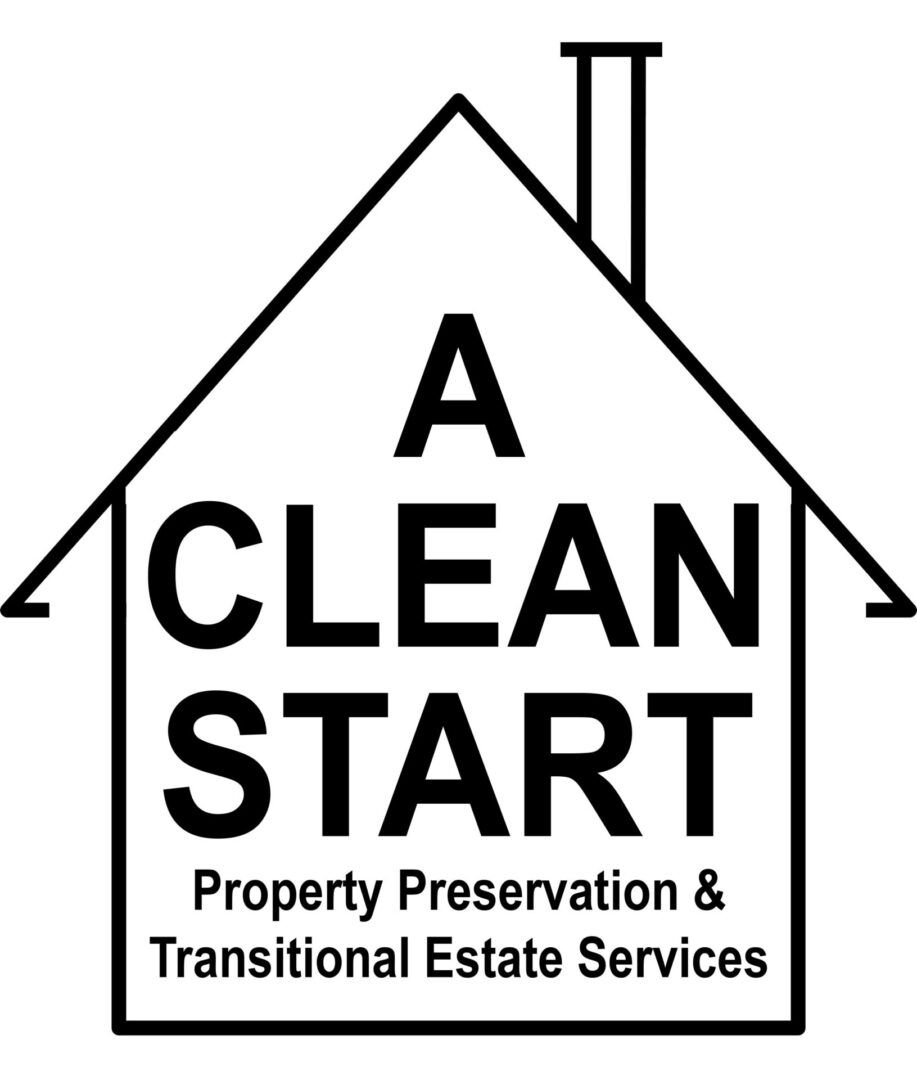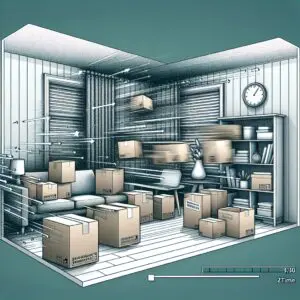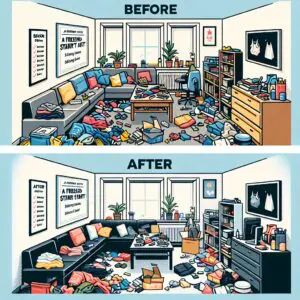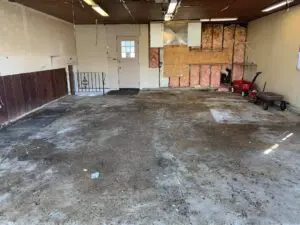1. Identifying if You’re a Hoarder
As we delve into the topic ‘Are You a Hoarder? Weekend Clean-Out Checklist for a Fresh Start,’ we begin by introspectively examining ourselves to identify if we are hoarders. Scrutinizing the signs of a hoarding problem will be our first step, drawing the line between being a passionate collector and an actual hoarder. Understanding the psychology behind hoarding will subtly guide us in recognizing our patterns. Buckle up for this journey of exploration and self-discovery as we clear the clutter to pave the way for a fresh start.
1.1 Signs of a Hoarding Problem
Uncovering whether you might have a hoarding problem is the essential first step towards gaining a fresh start. By understanding and acknowledging the signs, you empower yourself to take corrective measures. This introspection is a journey towards an uncluttered, happier life, and it all commences with asking honest questions: Are You a Hoarder?
Identifying a hoarding problem is not a straightforward process, as hoarding behaviors often go unnoticed until they become extreme. Some signs to look out for include extreme attachment to items, difficulty in discarding possessions, acquiring items that are not needed, and living spaces being cluttered to the point of being unusable. If these sound familiar, it’s time to tackle the issue head on. Our guide ‘Simplify Your Move: 2024 Home Transition Checklist Essentials’ can provide information on how to transition into a clutter-free lifestyle.
The psychological aspect of hoarding cannot be ignored. Often, hoarding is correlated with emotional distress, anxiety, or depression. This emotional connection to items can make it extremely hard to let go. Recognizing this fact is equally essential in the journey of decluttering. At ACleanStart, we assist not only with the physical removal of items but also provide help navigating through the often stressful process.
Remember, identifying oneself as a hoarder is not an admission of failure but a courageous step towards a clean, fresh start. Whether you’re just starting to see signs of a hoarding problem or you’re ready to begin your decluttering, our Weekend Clean-Out Checklist is a valuable tool on the road to reclaiming your space and peace of mind.
1.2 The Psychology Behind Hoarding
The psychology behind hoarding is complex and varies from individual to individual. However, there are some common threads that can start to unravel this intricate behavior. Understanding the psychological factors that contribute to hoarding can be a pivotal first step in acknowledging the problem and seeking help. Postulating the question “Are You a Hoarder? Weekend Clean-out Checklist for a Fresh Start” is our approach to assisting individuals with hoarding tendencies.
Hoarding is often linked with obsessive-compulsive personality disorder (OCPD), obsessive-compulsive disorder (OCD), attention-deficit/hyperactivity disorder (ADHD), and depression. While it may seem externally as a simple issue of clutter and disorganization, the roots are, in fact, deeply entangled in emotional distress. This could manifest in excessive attachment to personal belongings or an inability to discard items due to a need to save them.
People with hoarding tendencies often associate their possessions with memories and fear that dispelling their belongings equates to losing their memories. There is also the psychological anxiety of potentially needing an item in the future and not having it. At A Clean Start, we understand these complex challenges and offer tailored approaches to help those dealing with hoarding.
Finally, the psychology behind hoarding is not limited to the individual collector. It also extends to the impact on the hoarder’s relationships and their living conditions. A disorganized physical environment can mirror mental clutter, exacerbating feelings of stress and despair. Overcoming hoarding is not a simple weekend task – it’s a journey towards a fresh start. So, if you’re asking yourself, “Are You a Hoarder?,” remember that recognizing the problem is the first step towards resolution.
1.3 Hoarding vs Collecting
It’s essential to discern the difference between collecting and hoarding as these are distinct behaviors with diverse impacts on an individual’s life. Collecting is a conscious and organized endeavor, typically focusing on a particular category or kind of item. Individuals who collect showcase pride in their collections and often arrange them for visual appeal. Their acquisitions don’t interfere with their everyday life, and they exhibit control over their collections. Collectors often aim to complete a set, enjoy the chase, and are keen on bringing order, beauty, and value into their lives. Still, this can easily transform into a hoarding disorder if control begins to slip. If you’re a hoarder, weekends are perfect opportunities for a fresh start.
On the contrary, hoarding is a behavioral condition where individuals find it hard to part with their possessions, fearing they might need them later. This results in a cluttered living space and often triggers distress or impairment. Hoarding behavior is typically driven by anxiety and is often associated with emotional attachment to items. The distress that accompanies dispensing of items differentiates a hoarder from a collector. A clear line of sight would be if the accumulation of items begin to obstruct the functionality of your living spaces or bring about any form of discomfort to you or others around you. To confirm if you’re a hoarder, the first step is acknowledging that you need help. We have a great blog post titled “Transitioning Estate Planning: Navigating Life’s Changes with Ease” that you should explore.
If you’ve been asking yourself, “Are You a Hoarder? Weekend Clean-Out Checklist for a Fresh Start” can help you recognize these behaviors in your routine. Also, this will guide you towards the first steps of decluttering. In light of recognizing these habits, it’s crucial to begin to prioritize decluttering your space. A clean start can bring about a sense of renewal, enabling you to live more efficiently and enhance your overall quality of life.
2. Steps to Declutter Your Space
Are you a hoarder eager for a fresh start? Then it’s time to dive into refining the quality of your surroundings. In our Weekend Clean-Out Checklist, we provide essential steps to declutter your space. This section clearly outlines how to prioritize your spaces and set realistic cleaning goals, ensuring meaningful and enduring results. Adjust your lifestyle with our expert-led tips and techniques designed to help you make significant strides in your journey towards a cleaner, more breathable environment.
2.1 Prioritize Your Spaces
One of the first stages in overcoming the accumulation of items in your home – whether that’s the result of hoarding tendencies or simply years of unchecked clutter – is to prioritize your spaces. This process revolves around identifying the areas in your home that require the most immediate attention. Such regions typically include those frequently used or those where clutter is affecting your day-to-day activities most. Effectively, these areas form the starting points for your ‘Are You a Hoarder? Weekend Clean-Out Checklist for a Fresh Start’ journey.
To prioritize your spaces, you need to first take a comprehensive tour of your home. Carefully review every room, assess the amount of clutter present and rank each space according to the severity of their disorganization. Make a note of rooms or spaces that overwhelm you with their cluttered status – these spaces need to be given higher precedence. For more support and guidance on how to approach this process, feel free to reach out to our team. Remember, the initial step of prioritization is critical for your ultimate goal – attaining a fresh, clutter-free start. It forms the foundation for your Weekend Clean-Out checklist, steering you towards the right direction.
2.2 Set Realistic Cleaning Goals
Admitting that you might be a hoarder is the first step to reclaiming your space and finding a fresh start. But to maximize the results from your weekend clean-out, it’s crucial to set some realistic cleaning goals. This doesn’t mean you need to clear out your entire space in two days. It’s about breaking down your cleaning project into smaller, more manageable tasks.
Now, you might be wondering how to set realistic cleaning goals. Well, consider your available time, energy and resources. Instead of aiming to declutter an entire room like the basement in a single day, plan to spend an hour each day organizing a specific area. Maybe you start with a small corner, or even a single drawer. Setting attainable goals can minimize feelings of overwhelm and make the cleaning process feel less daunting. Remember, the goal isn’t necessarily to transform your space overnight, but to make steady progress throughout your ‘Are You a Hoarder? Weekend Clean-Out Checklist for a Fresh Start.’
Try and keep track of what you’ve accomplished and celebrate your small victories. For example, after you eliminate clutter in a certain area of the house, take time to appreciate the difference. This can give you the motivation to tackle the rest of the space. Setting real cleaning goals and meeting them is a fulfilling experience and a good way to start your journey towards a clutter-free life – whether that’s in the context of transitional estate services or just a cleaner, more organized home.
Lastly, be patient with yourself. A complete decluttering process takes time. Try to treat yourself kindly, and don’t get discouraged if you don’t meet every goal right away. The key is to stay consistent and keep moving forward. Good luck with your ‘Are You a Hoarder? Weekend Clean-Out Checklist for a Fresh Start’. Remember, positivity and persistence go a long way.
2.3 Cleaning Techniques for Hoarders: One Thing at a Time
Tackling an overwhelming mess might feel daunting, especially if you identify as a hoarder. But don’t worry! An effective way to approach this is by taking one step at a time. Rather than trying to clean your entire house in a day, focus on one area or one category of items at a time. This method is not only manageable but it also provides a sense of accomplishment that fuels motivation to continue decluttering.
So, how should you start? Begin with a smaller task. It might be a single drawer, a cabinet, or a closet. Ensure you set aside a specific time every day to keep the momentum going. After finishing one, move on to the next. Alternatively, you can categorize your items. Just pick one category, let’s say clothes. Gather all the clothes from every room and start sorting them out. Once you’re done with clothes, move on to the next category. This might take some time and patience, but remember, you’re making a fresh start by taking control of your life again. For more tips about decluttering your space, you can visit our blog.
While decluttering, don’t forget to keep a box or bag nearby for items you want to donate, sell, recycle, or throw away. Do not spend too much time deciding the fate of an item – if you’re unsure, put it in a “maybe” box and revisit it later. Make sure you remove the trash, recyclables, and donations from your home as soon as possible to avoid second thoughts.
The decluttering journey might be overwhelming. Don’t be too hard on yourself, starting is already a big step. Celebrate the small victories along the way and remind yourself that you’re doing this for a more organized, peaceful, and better living environment. It’s not just a weekend clean-out, but also a brave step towards a fresh start.
3. Organizing Your Space Post-Cleanup
In our journey to address the question, “Are You a Hoarder?,” we’ve reached a crucial phase: post-cleanup organization. After a weekend dedicated to a comprehensive clean-out, achieving a fresh start requires an effective strategy for maintaining a tidy and structured space. This section will guide you through efficient steps to organize your newly cleared area and crucial habits that can help prevent clutter from creeping back into your life. “One in, one out” could be your cardinal rule to ensure your living environment keeps its refreshing, clutter-free appeal.
3.1 Tips for Organizing Your Newly Cleared Space
Organizing your newly cleared space may feel like an intimidating task, especially after a massive cleanout. However, with an effective system in place, it can be a breeze. The first step is to create ‘zones’ or designated areas for specific items. For example, you might name one area ‘Books’, another ‘Kitchenware’, and so forth. Once everything is categorized, the process of returning items to their appropriate places becomes much simpler.
It’s essential to keep the ‘one in, one out’ rule in mind. This rule means for every new item you bring into your home, one item should leave. This strategy ensures your space remains as clutter-free as possible. You may want to consider investing in various storage solutions to further aid your organization efforts. There are countless options available, from shelving units to storage bins. You can explore further ideas and solutions on our blog.
Make an effort to regularly reassess the organization of your space. Over time, our needs and lifestyles change and our space needs to appropriately reflect and adapt to these changes. Schedule monthly check-ins for each area in your house to keep clutter under control.
Remember, the goal isn’t just to clean and declutter but to create a system that supports a better functioning, more comfortable living space. By harnessing a mindful approach to organization, you’ll make your newly cleaned space truly shine.
We understand that it can be a challenging process, especially if you’re doing it alone. If you need professional help, feel free to contact us, and let’s give you that clean, organized fresh start you deserve. Made possible by our expertise in transitional estate services
3.2 Recurring Decluttering: A Must-Have Habit
Recurring decluttering is more than just a chore; it’s a lifestyle adjustment leading to a healthier, more organized living environment. It’s an essential habit if you consistently find yourself asking, “Am I a hoarder?” In the aftermath of a big weekend clean-out, maintaining a well-ordered home becomes less daunting. By adopting this habit, your life can be transformed, as every future “Weekend Clean-Out Checklist for a Fresh Start” becomes less and less overwhelming.
Staying true to a recurring decluttering habit doesn’t require daily, strenuous labor. Simplify the task by allocating small blocks of time for decluttering on a regular basis. A couple of minutes each day dedicated to simple tidying tasks can have a long-term impact, making larger cleanup weekends less frequent. For more specific advice or professional help in maintaining a clean, organized home, reach out to our team at ACleanStart.net. Remember, every fresh start begins with a single act of cleaning!
Embrace decluttering as an ongoing activity, like cooking or laundry. Motivate yourself by considering the benefits: increased productivity, less stress, and an overall improved lifestyle. Imagine waking up in a space devoid of clutter and chaos. Now stop imagining and make this your reality! “Are You a Hoarder? Weekend Clean-Out Checklist for a Fresh Start” isn’t merely a rhetorical question or a checklist; it’s a way of life and a step towards a healthier, happier you.
Finally, see decluttering activities as a chance to reconnect with your home. This new habit not only transforms your space but also transforms your relationship with the items in your home. Enjoy the feeling of liberation as you let go of items that you no longer need. One thing to keep in mind is that getting a fresh start is not a one-time event, but an enduring commitment. Let’s venture into this lifestyle change together. For more tips on how to sustain your clean-out efforts, browse our collection of blogs on ACleanStart.net.
3.3 Rule of Thumb: One In, One Out
Having a well-organized, clutter-free home is not only aesthetically pleasing, but it also contributes to better mental health. One useful post-cleanout strategy to maintain this cleanliness and organization is to adopt the ‘One in, One out’ rule. As the phrase suggests, for every new item you introduce into your home, an equivalent item should go. This simple rule can prevent an over-cluttered scenario that might have characterized your space prior to the ‘Are You a Hoarder? Weekend Clean-Out Checklist for a Fresh Start’ intervention.
This rule is not only applicable to the hoarder alone. It’s a general rule that even non-hoarders can incorporate into their lives simply for the orderliness it brings. This strategy is especially handy for commonly cluttered spaces like the living room, bedroom, and kitchen. In a scenario where you purchase a new coffee maker, for example, it’s advisable to dispose of or give out the old one. If you tend to keep items for sentimental reasons, consider digitalizing your pictures and other memorabilia with many online tools available. Do remember that the key is to maintain the progress you’ve made by following the ‘Simplify Your Move: 2024 Home Transition Checklist Essentials‘ you found helpful.
4. When to Seek Professional Help for Hoarding
When battling hoarding habits, you may often find yourself stuck at a particular point asking, “Are You a Hoarder? Weekend Clean-Out Checklist for a Fresh Start.” But what happens when organizing on your own is not enough? This is where recognizing the need for professional assistance plays a crucial role. From efficient handling by professional organizers to emotional support from therapy and support groups, this section delves into when and why seeking expert input becomes an essential step to renew and refresh your world.
4.1 The Role of Professional Organizers
It’s not unusual to feel somewhat overwhelmed when beginning a significant clean-out project, especially when dealing with a potential hoarding situation. Don’t be too hard on yourself; there is no shame in seeking help. When the task at hand appears too daunting, or the emotional connection to objects too strong, it might be time to call in the experts – professional organizers like those at Clean Start. Professionals can provide an objective perspective, a structured approach, and they’re also extremely hands-on, turning cluttered spaces into serene, functional environments.
Professional organizers play a significant role in the decluttering process. They are experienced in assessing, planning, organizing, and implementing strategies that not only bring order to your home but also help maintain that cleanliness long-term. They are also well-versed in recognizing the signs of serious hoarding behavior, providing a more profound level of care. By offering compassionate, judgment-free assistance, these professionals can help hoarders make difficult decisions about what to keep, donate or discard. Sharing personal experiences, success stories, and tested strategies, they can empower you to kickstart your journey towards a fresher, less cluttered home and, more importantly, a more relaxed and organized lifestyle.
The key to a successful home clean-out is not to do it all at once, but to take it step by step. And with experts by your side, you can make significant strides with a structured strategy. The Clean Start team, for example, can help to arrange, categorize, and safely dispose of unwanted items. These professionals can relieve the stress associated with cleaning out a home, thanks to their extensive experience and pragmatic way of dealing with household clutter. So whether you’re a self-confessed hoarder or just feeling cluttered, don’t hesitate to reach out for help. Remember, everyone deserves a fresh start.
4.2 Therapy and Psychological Help
It’s crucial to comprehend that hoarding is more than just a lousy habit; it’s a psychological process. While some individuals might merely require a thorough clean-out, others may require more specialized help. If you’re finding it impossible to start your journey to decluttering irrespective of several attempts or if you’re experiencing distress when discarding possessions, it might be time to consider therapy or psychological help.
Professional therapists and psychologists can provide valid treatments like cognitive behavior therapy (CBT), which has proven to be highly effective for hoarding. These experts focus on analyzing your thought processes and emotions behind your behavior and implementing strategies to combat them. Those suffering from severe hoarding issues often find themselves overwhelmed and incapable of making decisions about what items to keep and what to discard. Here, therapists can offer practical assistance in decision-making building, advocacy skills, and coping strategies to aid you in your journey towards a cleaner, healthier lifestyle.
See a good therapist or psychologist as a guide, a beacon that brings clarity to your situation. They concentrate on the root problems that lead to excessive hoarding and guide you through proper trauma healing and coping strategies. By penetrating deeper beneath the surface clutter, therapists can assist you in understanding and managing your hoarding tendencies better.
Remember, it’s okay to need help. It’s okay to seek it. If you believe your hoarding behavior is out of your control, our advice is to reach out to a professional therapist or psychologists. A Clean Start offers a network of trusted professionals who deliver compassionate care while understanding your unique circumstances. Take the first step toward your clean start today by visiting our contact us page to request more information about therapy and psychological help.
4.3 The Benefits of Support Groups
The journey towards overcoming hoarding is a daunting process that requires enormous motivation as well as supported guidance. This is where support groups come in, offering substantial benefits for hoarders keen on initiating transformative life changes. A question a day, like ‘Are You a Hoarder? Weekend Clean-Out Checklist for a Fresh Start’ can propel one’s motivation to start decluttering and organize their life better. Ingraining a minimalist lifestyle becomes a tad bit more viable when you’re surrounded by a dedicated team united by shared experiences and a focus towards individual recovery.
Support groups provide a secure platform for free expression, where you can comfortably share your experiences without the fear of judgment. Through this open exchange of ideas, you can learn new coping strategies and organizational tips. Perhaps you grapple with discarding items due to their sentimental value – someone in the group might offer a unique perspective that allows you to view your belongings in a different light. Consider tips from the ‘Are You a Hoarder? Weekend Clean-Out Checklist for a Fresh Start’ blog on A Clean Start.
This benefit isn’t merely a one-way street. Helping others in their recovery process can amplify your self-esteem and sense of purpose, thereby driving your own progress as well. The sense of community also works to alleviate feelings of isolation that often accompany hoarding, replacing them with a network of individuals who truly understand your struggle. Knowing that you’re not alone in this can be a powerful motivator on tougher days when progress seems slow or stagnant.
Lastly, support groups can provide information or links to professional help if one needs it, such as therapists, organizers, or cleaning services like A Clean Start. This collective knowledge can be instrumental in overcoming hurdles during your clean-out journey. All things considered, reaching out for help and joining a group can be an impactful step in your journey towards a well-organized, clutter-free life. Remember, every journey starts with one step, make ‘Are You a Hoarder? Weekend Clean-Out Checklist for a Fresh Start’ the one for you today.










